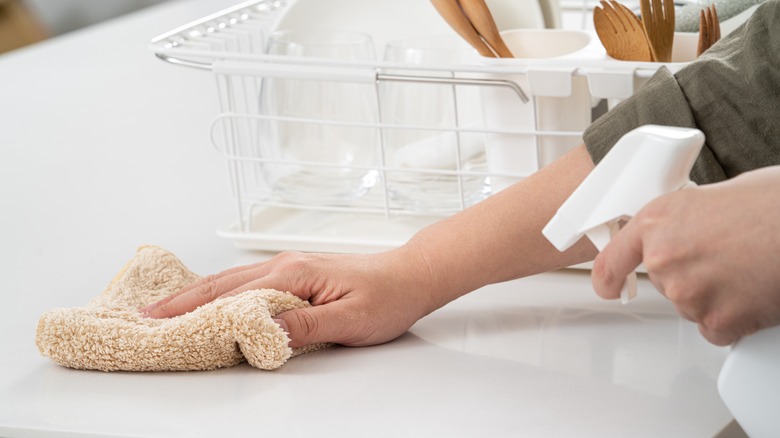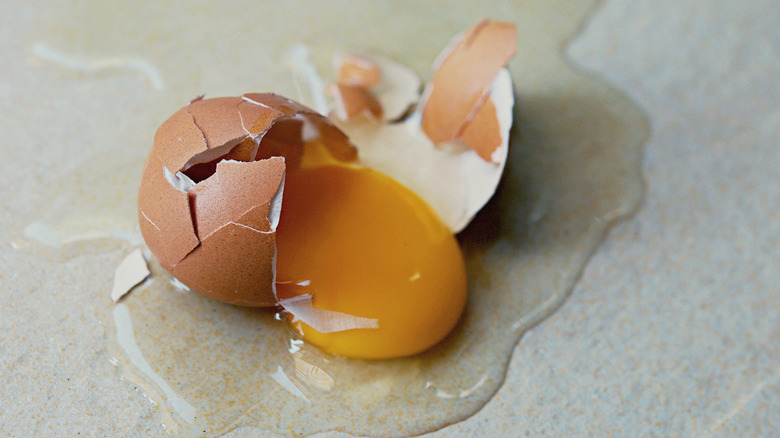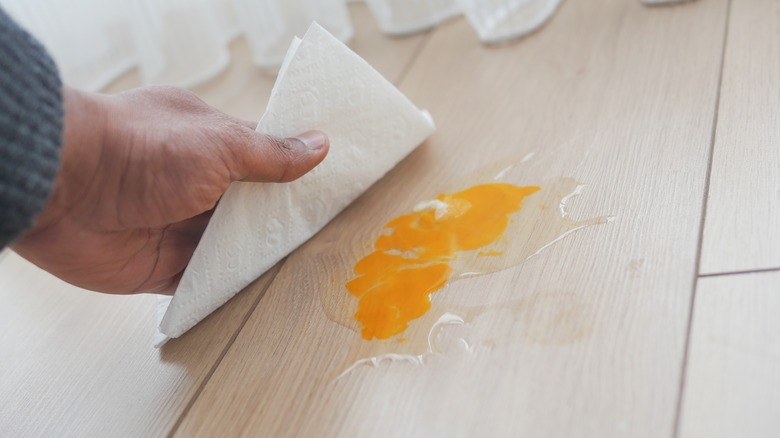One Kitchen Mess You Don't Want To Clean With Vinegar
Ask folks what natural, all-purpose cleaning product they use to tackle most messes in their homes, and no doubt you'll hear lots say they like to use nothing more than distilled white vinegar. Vinegar is beloved as a versatile cleaner in the kitchen because it's natural and a product we often use in food, so there's no fear of harsh chemicals contaminating our food ingredients or food prep areas. Some like to add a splash of vinegar to their DIY natural cleaners or just use a combo of vinegar with water as an all-purpose spray. But one purpose you shouldn't use vinegar for is a raw egg spill.
When you manage to crack an egg a little too hard on the countertop or stir a bowl of scrambled eggs with too much vigor, don't make the biggest vinegar-cleaning mistake and try to use it on the egg spill. "Cleaning egg messes with vinegar solution will cause the protein enzymes in the egg to coagulate and will make the stains even more impossible to clean up," explains cleaning professional Lily Cameron (via Family Handyman). We'll walk you through why vinegar should be avoided for egg cleanup due to its chemical makeup and what you should use instead.
How vinegar reacts with eggs
White distilled vinegar contains acetic acid, which is often used in everyday commercial cleaners and is particularly useful for breaking down alkaline stains, like those left behind from hard water minerals, such as magnesium and calcium. It also doubles as a mild disinfectant, which is great for anyone who wants to avoid using harsher, synthetic chemicals, like bleach. This makes it appealing to use against raw eggs, which are commonly known to potentially carry salmonella, which can cause food poisoning. But this is a mistake.
Eggs are little more than protein, lipids, and water. When vinegar comes in contact with raw egg, the proteins start to harden. This is exactly why you'll often see egg poaching recipes call for adding vinegar to the water — because this makes the liquid egg whites into a solid more quickly than hot water can alone. But what makes for a great poached egg does not make for an easy cleanup job; the sticky and stubborn egg will require more scrubbing. Any good cleaning tip means you can work smarter, not harder, so don't reach for the white vinegar when an egg spill happens. This reaction will also occur with another cleaning favorite, apple cider vinegar – and any other vinegar for that matter.
What to use to clean egg spills
Just because we don't recommend vinegar on egg spills doesn't mean all is lost for those who want to keep cleanup as free of chemicals as possible. Instead, you can tackle raw egg messes with dish soap and warm water. Dish soap is a versatile and effective cleaner that will make quick work of it, as the soap emulsifies the fat and water in the egg, pulling it off the surface of the counter and making it easy to wipe away. Absorb as much of the broken egg with a paper towel as you can (perhaps saving the broken eggshells for unexpected uses in the garden); then work dish soap and water into the area, and wipe it away with another paper towel.
Despite being a fantastic cleaner, soap and water is not an effective sanitizing solution. As mentioned above, raw eggs may carry salmonella bacteria, which is why in addition to using a disposable paper towel for cleanup, sanitizing the area is a necessary step. Thankfully, once the actual egg is washed away with soap, you can totally use vinegar as a final disinfecting round. The acetic acid in vinegar has been proven to have anti-microbial properties and is able to kill salmonella. This one-two punch will help you safely and effectively clean up raw eggs.


